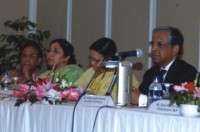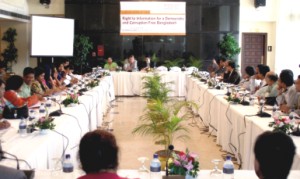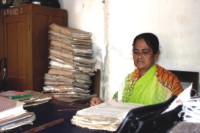|
Conference
Right to Know and Think
Hana Shams Ahmed
 |
The Chief Advisor Dr. Fakhruddin Ahmed at the convention with former Advisor Advocate Sultana Kamal, the Executive Director of Manusher Jonno Shaheen Anam and Dr. Shamsul Bari. Photo: Anisur Rahman |
Rabindranath's Roktokorobi gives a picture of an autocratic system of governance where the greedy and corrupt king keeps himself far away from the majority working class. The poor labourers are expected to do backbreaking work all day long and when one of them puts a question across to his supervisor, he gets a curt reply, “Who has asked you to think? Who asked you to voice your opinion?”
Things haven't changed much since then. In present-day Bangladesh the everyday challenges that a common citizen faces are somewhat similar. The huge gap between the authorities and the common people can be signified by one single incident - the big haul of relief materials recovered from certain politicians' treasure troves which were originally meant for the poor. The people for whom the relief materials were meant for obviously never got to question the authorities how much relief was allotted for them and had to be content with what was handed down to them. But that is just the tip of the iceberg. There are only too many examples of such undiscovered misappropriation of funds, which are the result of the existing, outdated laws that create an information barrier between the people and their representatives in government.
 |
Manusher Jonno Foundation organised a roundtable with journalists and civil society personalities. Photo: Zahedul I. Khan |
In an ideal democracy the people of the country have the right to know what the government and the duty-bearers are doing, they have a right to know what their decisions are based on, and they have a right to be part of that decision-making process. One of the ways these rights can be established is by ensuring that there is a law that allows the free flow of information from the authorities to the citizens and the one law that can ensure this right is the Right to Information (RTI) Act which is now effective in 75 democratic countries of the world. The Indian parliament passed the law in 2005 and in Nepal it came into effect a few months ago. In Pakistan although the law exists, there are serious questions about the extent of its implementation. Although the Bangladesh Constitution does not make a specific reference to a 'right to information', in article 39 of the Fundamental Rights section it says, “Freedom or thought and conscience is guaranteed… subject to any reasonable restrictions imposed by law in the interests of the security of the State, friendly relations with foreign states, public order, decency or morality, or in relation to contempt of court, defamation or incitement to an offence… the right of every citizen of freedom of speech and expression; and freedom of the press, are guaranteed.” Unfortunately some archaic laws handed down from colonial times are still in place, which are preventing citizens from practicing that right. These include The Evidence Act 1872 and The Official Secrets Act (OSA) 1923. In the OSA clause 6, information from any governmental office is considered official information and cannot be disclosed. The 1979 Government Servants' (Conduct) Rules, the 1996 Rules of Business and Oaths of Secrecy further widen the gap between the people and their representatives.
Manusher Jonno Foundation (MJF), an organisation that advocates for human rights and good governance, has been working to press forward the RTI Act for some time now. On December 5 the foundation arranged a convention on “Right to Information for a Democratic and Corruption Free Bangladesh” with the Chief Advisor to the Caretaker Government Dr Fakhruddin Ahmed as the Chief Guest and Law and Information Advisor Barrister Mainul Hosein and Former Advisor Advocate Sultana Kamal as special guests.
 |
Information held by the government should be accessible by the
people for transparency and accountability. Photo: Zahedul I. Khan |
“Right to information creates legal entitlement for people to seek information and includes duty of the public function bodies, government and non-government to make information public and easily available,” says Shaheen Anam, the Executive Director of MJF, “we believe that this is an opportunity for Bangladesh to strengthen democracy and establish a more open and transparent system of governance. People will have confidence in the system which will create a sense of responsibility on them and I would go so far as to say it will give the people right to exercise their citizenship.”
Anam describes how every year the national budget is formulated and presented without much input from the public. Although there are debates and discussions preceding it there is little scope to question or influence it at the formulation stage. At the local level people never get to question how development funds coming to the union parishad level are utilised, what the government procurement system is or how the government safety net programmes are implemented. “In fact there is little awareness among the general population that getting certain information is their right as taxpayers,” says Anam, “unfortunately a culture of secrecy prevents sharing of information.”
Even if the Act were to be passed, the implementation of the law is a major challenge. “And the first challenge lies in changing the mindsets and attitudes of people who use info as power and are extremely reluctant to part with it,” says Anam, “the RTI Act should also be applicable for private institutions and NGOs should also come under its purview.”
A working paper proposing a draft RTI Act was drawn out in 2002 by the Law Commission. MJF initiated a core group for drafting a revised Right to Information Act on the basis of the Law Commission working paper. Advocate Sultana Kamal, Advocate Shahdeen Malik, Dr. Shamsul Bari, Advocate Alina Khan, Professor Asif Nazrul and Barrister Tanjib Ul Alam are the active members of this group. MJF prepared a draft RTI Act.
“We know that the ministries on behalf of the government preserve information. We see that on the day of the election a person goes and places a vote in the ballot box, and we say that the people have participated,” says
Sultana Kamal, “but participation cannot end there, it is a continuous process.”
“Women understand the need for information the most,” says Kamal, “because in a family one single sentence from a husband can stop any further response from a wife, and that is, 'what do you know'. Every right of a person can be snatched away with that one sentence, and we want to see that changed under a democratic government.”
“An ignorant nation can never be a responsible nation,” continues Kamal, “if we want to make people responsible, we must give them knowledge and create an environment where they can gain knowledge. And this is not just the responsibility of the journalists.”
Barrister Mainul Hosein, at the convention, mainly touched on the responsibility of news media to handle information to protect the public interest so that the disseminated information does not harm the national security, environment, economy, business or diplomatic relationships with other countries. “It is not an omnibus right,” he said, but added, “the current government will pass this law but after the present government has finished its tenure, the journalists and civil society members have to play a very important role in ensuring that the law is passed in the parliament, otherwise it will have no effect.”
The Chief Advisor expressed his hope that the Law and Information ministry would take immediate steps to enact the draft RTI Act. “We want to present the nation with an RTI law in the near future,” he said. Emphasising on his government's commitment to promote good governance in the country he said, “I personally believe that there is a direct relationship between information dissemination and socio-economic development. Free flow of information plays an important role in building a transparent and accountable government.”
The past governments have dilly-dallied with this RTI Act for too long, but that just went to serve their purpose and the corrupt politicians and businessmen in the process managed to multiply the figures in their bank accounts in unimaginable proportions. Whether the present caretaker government takes positive steps to enact the Right to Information Act will show how committed they are to root out corruption from this country and hand the power to the people for a truly democratic form of government.
Copyright (R) thedailystar.net 2007 |
